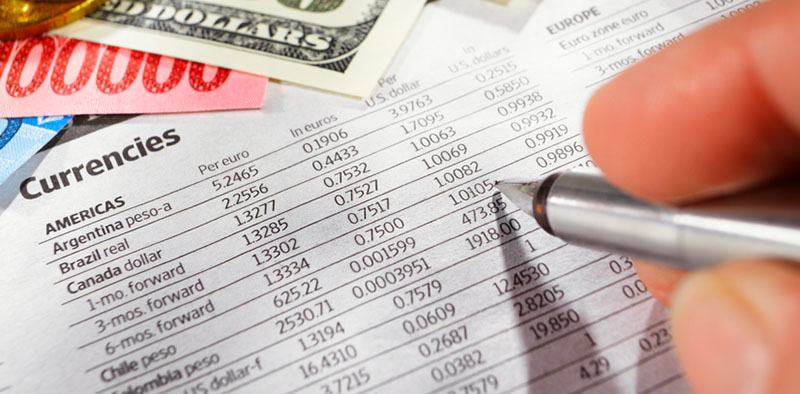All About Currency Risk
Feb 25, 2024 By Triston Martin
The risk associated with the fluctuation of one currency's value relative to another is known as currency risk or exchange-rate risk. Foreign exchange risk is a potential profit or loss source for international investors or companies with international activities. Many institutional investors use the foreign exchange, futures contracts, options contracts, and other derivatives as risk management tools, including hedge funds, mutual funds, and multinational organizations.
Businesses and individuals who deal with foreign exchange are in danger. Hedge funds, mutual funds, and large multinational organizations use the foreign exchange market and derivatives such as futures and options to protect themselves from currency fluctuations.
Hedging, or offsetting, currency movements can help decrease risk exposure. For instance, the realized return for a U.S. citizen who invests in Canadian stocks is influenced by both the rise and fall of the Canadian currency relative to the U.S. dollar. Suppose an investor earns a 15% return on Canadian stocks, but the Canadian currency falls in value by the same amount relative to the U.S. dollar. In that case, the investor loses money after accounting for trading costs.
Exchange-rate examples

U.S. investors can hedge against currency fluctuations by putting their money into countries with rising currency and interest rates. Yet, investors must consider a nation's inflation rate before making decisions, as high debt levels frequently come before inflation. There could be a decline in a country's currency as a result of a loss of economic confidence. The debt-to-GDP ratio tends to be low in countries with appreciating currencies.
Because of its political low debt-and stability to-GDP ratio, the Swiss franc is a example of a currency that is likely to remain strongly supported. Stable exports from the country's agriculture and dairy industry are anticipated to keep the New Zealand dollar strong, contributing to the potential of interest rate hikes. When the U.S. dollar weakens, usually because American interest rates are lower than those of other countries, foreign companies tend to fare better.
Due to the lower potential returns on bond investments, bondholders may be vulnerable to currency risk. The impact of currency fluctuations on a foreign bond index can double the return on investment in that index. Bonds denominated in U.S. dollars provide investors with more stable returns since they eliminate exposure to currency fluctuations. Conversely, diversifying your portfolio across countries and regions is a smart way to protect yourself against the risks associated with currency fluctuations.
Countries like China that have their currency tied to the U.S. dollar may attract investors. One potential downside is that central banks could change the pegging relationship, reducing investor returns.
Conditions Unique

Numerous ETFs and mutual funds are constructed to hedge against foreign exchange (Forex), options (Options), and futures (Futures) market volatility. Due to the strengthening of the dollar, many currency-hedged funds have been established in both developed and emerging nations, including China, Japan, Germany, and the United Kingdom. Currency-hedged funds cost more than their non-hedged counterparts and may affect your returns.
In addition to its more affordable flagship foreign funds, BlackRock's iShares also offers a family of currency-hedged exchange-traded funds. Due to the falling dollar value, investors started cutting their holdings in currency-hedged exchange-traded funds (ETFs) at the beginning of 2016. This trend has continued and resulted in the closure of several currency-hedged ETFs.
Play without worry with $100,000 in play money. Try your hand at stock trading with our no-risk simulator. Try your hand at trading against the thousands of other Investopedia users. Trade hypothetically first, rather than with real cash. Getting experience in a simulated trading environment will prepare you for success in the real Market. Invest like a pro with our Stock Market Simulator.
Interrelated Concepts
Foreign exchange rate swings before settlement pose a threat known as "transaction risk." More A Comprehensive Guide on Handling Systemic Risk in the Market The term "market risk" refers to the potential for financial loss on the part of an investment as a result of wider market fluctuations. More The Meaning of Investment Risk, Its Quantification, and Control
There are many kinds of risk, but we may generally define it as the potential for actual results or returns diverging from projections. More Foreign Exchange Market (Forex) Trading Procedures The Forex, or Foreign Exchange Market, is a decentralized platform for exchanging currencies worldwide.
In other words, what exactly is a peg? A currency peg occurs when a country's government or central bank decides to maintain a constant exchange rate between its currency and another currency.
-
 FinTech Oct 13, 2024
FinTech Oct 13, 2024Revolutionizing the Future: Modernizing The Credit Approval Process
This article explores how technology like AI, big data, and blockchain is revolutionizing credit approval, enhancing efficiency, security, and inclusivity.
-
 FinTech Oct 13, 2024
FinTech Oct 13, 2024Navigating Global Markets: Safely Expanding with International Credit Reports
Leverage international credit reports to enhance global expansion efforts by mitigating risks, making informed decisions, and maintaining regulatory compliance.
-
 FinTech Sep 08, 2024
FinTech Sep 08, 2024Hybrid Agencies: Managing Remote Work and Global Teams Effectively
A hybrid agency offers flexible marketing services that are suited to each client's needs by combining the knowledge of in-house and outside experts.
-
 Savings Sep 23, 2024
Savings Sep 23, 2024How to Cut Costs: Saving on Your Phone Plan Amid Rising Prices
Discover how to save money on your phone bill by exploring prepaid and postpaid plans, family options, and effective negotiation strategies with your provider.
